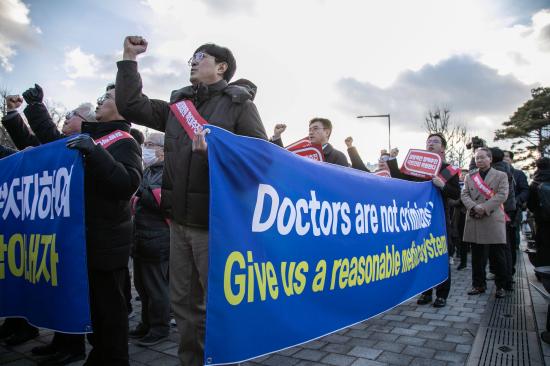
The Korean Medical Association (KMA) held a national meeting of doctors at its headquarters in Yongsan, Seoul, on the afternoon of September 9. After voting within the KMA, the KMA decided to suspend all medical services from March 18 to protest against the government s monopolization of medical services and education. The move has aroused widespread concern in all sectors of society, and people have expressed concern about the normal order of medical services.
It is understood that between 4 and 7, the medical association voted on "whether to support the medical Association's tough struggle against the government's medical reform" and "whether to participate in collective actions such as the medical Association's suspension plan in June." According to the results of the vote, 90.6% of the participants supported the struggle against the government's monopolistic policies in medical care and education, and supported the collective suspension of medical treatment; At the same time, 73.5% of participants supported group action, including rest visits. Among the nearly 130,000 members of the Medical association who have the right to vote, more than 70,000 people participated in the vote, with a turnout rate of 54.8%, a record high, which fully reflects the strong dissatisfaction of the medical community with the government's medical reform policy.
It is worth noting that the collective suspension action will include a large number of doctors, including medical school professors, and is expected to have a great impact on the South Korean medical system. There has been serious chaos on the medical front as interns and residents have gone on strike since February in response to the government's policy to expand medical school enrollment, causing a large number of doctors to leave their posts. The comprehensive suspension of the medical association will further aggravate the chaos of the Korean medical system and bring great inconvenience to the Korean people's medical treatment.
South Korean Prime Minister Han Duck-soo expressed regret over the KMA's announcement of a collective suspension at a press conference on the 9th and promised not to take any administrative punishment against interns and residents who return to work. The statement eased tensions between the medical community and the government to some extent, but did not fundamentally resolve the controversy over the health care policy.
In fact, the root cause of the collective suspension of the medical association is the Korean government's policy of expanding medical school enrollment. Since February this year, the South Korean government has announced that it will expand the enrollment of medical schools from the 2025 academic year, which has triggered strong opposition from the medical community. The medical community believes that the expansion of enrollment will lead to oversupply in the medical market, reduce the social status and income level of doctors, and affect the quality of medical services. For this reason, the HKMA has repeatedly called on the Government to withdraw its enrollment expansion policy, but has not received a satisfactory response.
In order to express dissatisfaction and protest against the government's medical reform policy, the medical association decided to take the extreme action of collective suspension. However, this action will not only affect the normal order of medical services, but also bring potential threats to people's health. In response, the South Korean government said that it will take necessary measures to protect the life and health of the people, including issuing orders to individual doctors of the medical association to start work and stop reporting orders.
In response to the government's response, the medical association said it would closely monitor the development of the situation and decide whether to continue the strike based on the government's response. At the same time, the medical association also called on the government to take the demands of the medical sector seriously, review the medical reform policy, and seek a solution acceptable to both sides.
However, the medical association's collective suspension action has also triggered widespread concern and discussion in the community. Some people think that the HKMA's action is a necessary means to safeguard the rights and interests of doctors, and the Government should listen carefully to the demands of the medical profession; Others believe that the action of the medical association is too radical and may bring unnecessary troubles and losses to the public. In this regard, both the Korean government and the medical association need to seriously reflect and seek reasonable solutions.
In addition, the public has also expressed concern and unease about the collective suspension action. Many patients are concerned about not being able to access timely medical care during the suspension period, especially in emergency situations. Some patients believe that both the government and doctors should prioritize the well-being of patients, rather than putting the controversy ahead of the health of the public.

On October 16th local time, it was reported that a Boeing 737 MAX 8 flight of United Airlines from Denver to Los Angeles had its windshield break during the flight.
On October 16th local time, it was reported that a Boeing 7…
The World Economic Outlook Report released by the Internati…
The recently held G20 Finance Ministers and Central Bank Go…
According to recent reports by The Guardian and Reuters, th…
Recently, according to Japanese media reports, bear attacks…
In June 2025, a massive wave of protests swept across the U…